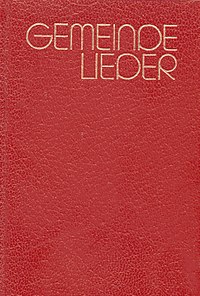Church songs
Municipality songs is the title of a song book, the first edition in 1978 was published and that until 2003, the official hymnal of the Union of Evangelical Free Churches (Baptist and Brethren) and the Confederation of Free Evangelical Churches was. It was also used in the Evangelical Free Churches and Free Evangelical Churches of the German Democratic Republic . It was also used by Austrian and Swiss Baptists. In liberal Protestant communities who solved municipality songs to Gemeindepsalter , Freikirchliches Evangelical communities in theVote of faith . A number of local congregations of the two free church federations, which for various reasons could not or not yet decide to buy the new hymn book Fieren & Loben , published in 2003, still use the congregational songs in their services today .
The hymn book community songs must not be confused with the hymn book of the same name published in 1942 .
scope
The hymn book contains 500 songs, 29 alternating readings from the Psalms as well as the Our Father and the Apostles' Creeds . In the appendix of the hymn book there is a detailed alphabetical index of the composers and poets with short biographical notes and the corresponding song references, an incomplete list of the Bible passages dealt with in the songs, a list of alternative melodies of certain songs and a list of the 500 church songs in alphabetical order.
The hymn book for the GDR was issued in 1980 and was basically the same size. However, there were some peculiarities: parts of some songs had not been approved for printing. These were the following songs:
- How often the praise will dry up by Otmar Schulz (# 74.): The second verse was not included. It read: “Hear the complaints of our brothers who are persecuted and imprisoned. If you give them freedom again, you take away their fear and anxiety. "
- Lord, your love is like grass and shore (# 332): the third stanza was not reprinted. Her text was: "And yet there are walls between people / and we only look at each other through bars ..."
- Just as my father sent me from Paul Ernst Ruppel (No. 414): The text is a combination of two Bible passages ( Joh 20,21 LUT and Lk 4,18 LUT ). The song was not approved even though it was in the Methodist Church hymn book . As a substitute we shall be your witnesses, Lord, open our mouths! used.
- Give Us Peace Every Day (No. 435): In one case of "anticipatory obedience", "give us freedom every day" became "give us faith every day".
In addition, the list of authors has been completely redesigned compared to the Western edition in order to relieve the writers and composers from having too many references to the West.
Songs
About 30% of the hymn book community songs offers songs from the 20th century, 22% come from the revival movement , 23% from the time of Pietism and 25% come from the classical epochs of Protestant chorales from Martin Luther to Paul Gerhardt . Martin Luther is represented in the songbook with a total of 15 songs written and / or composed by him. 25 songs by Paul Gerhardt and 12 by Gerhard Tersteegen are offered.
Structure of the hymn book
The four-part set congregation songs made - apart from the already mentioned change of readings and prayers - of four main parts.
The first part is dedicated to the divine service and is based on its liturgical elements: adoration (25), thanks (30), petition and prayer (20), word of God (21), congregation and fellowship (18), baptism (8), Last Supper (17) and praise and blessings (16).
A second section leads through the church year : Advent (20), Christmas (23), New Year (6), Passion (19), Easter (18), Ascension (6), Pentecost (18) and Second Coming (7).
The third section is entitled: Call to Faith . It has the following structure: invitation (15), repentance and faith (20) and confession (34).
The fourth and most extensive section deals with the topic of life in faith : discipleship (19), trust (33), mission and service (26), life path (23), death and eternity (18), tomorrow (12), noon ( 10), evening (13) and season (10). In the last section there are songs for Thanksgiving .
literature
- Association of Evangelical Free Churches, Association of Free Protestant Congregations (ed.): Community songs . 1st edition. Kassel / Witten <1978, ISBN 978-3-7893-7812-6 .
- Günter Balders: Please do not let Nos. 74, 332, 414 sing . In: Ulrich Materne u. a. (Ed.): Experienced in the GDR. Reports from the Federation of Evangelical Free Churches . Wuppertal / Kassel 1995, ISBN 3-7893-7220-X , pp. 330-332.
- Frerich Hokema: Working aid for church songs . 2nd Edition. Leer 1986.
Web links
- Christian song database with alphabetical listing of the songs contained in the hymn book of church songs ; Retrieved February 16, 2009
- Hymnal Collection: Baptist Hymnbooks , accessed February 16, 2009.
References and comments
- ↑ Günter Balders : Article Liedgut and song books ; in: Helmut Burkhardt, Erich Geldbach , Kurt Heimbucher (eds.): Evangelisches Gemeindelexikon , Wuppertal 1986, ISBN 3-417-24082-4 , p. 334, column 2.
- ↑ This and the following information according to Balders: Please don't ...
- ↑ Balders: Please do not let Nos. 74, 332, 414 sing . In: Ulrich Materne u. a. (Ed.): Experienced in the GDR. Reports from the Federation of Evangelical Free Churches , Wuppertal, Kassel 1995, pp. 330–332
- ^ Günter Balders: The emergence of German Baptism. A treatise on church history . ( Memento of the original from December 26, 2011 in the Internet Archive ) Info: The archive link was inserted automatically and has not yet been checked. Please check the original and archive link according to the instructions and then remove this notice. (PDF) p. 3 f .; Retrieved August 20, 2013
- ↑ The number in brackets indicates the number of songs.

